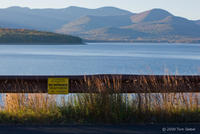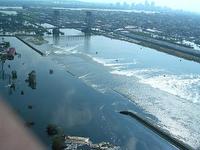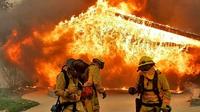-
Chile relies on new technologies to cope with frequent earthquakes
Citizens of Chile are used to the ground shaking beneath their feet; in the past two years alone Chile has experienced more than forty earthquakes with magnitudes of six or higher; with so many earthquakes and the potential of thousands dying yearly, Chilean authorities are using new methods to protect their citizens from death and buildings from damage
-
-
Hurricane Irene polluted Catskills watershed

The water quality of lakes and coastal systems will be altered if hurricanes intensify in a warming world, according to a Yale study; researchers found that last summer during Hurricane Irene — the worst storm in the New York area in 200 years — record amounts of dissolved organic matter darkened Catskill waters and affected the Ashokan Reservoir that supplies New York City with drinking water
-
-
Large 11 April 2012 earthquake triggered temblors worldwide for a week
This year’s largest earthquake, a magnitude 8.6 temblor on 11 April centered in the East Indian Ocean off Sumatra, did little damage, but it triggered quakes around the world for at least a week; the findings are a warning to those living in seismically active regions worldwide that the risk from a large earthquake could persist — even on the opposite side of the globe — for more than a few hours
-
-
Debate over causes of levee failure during Katrina intensifies

A court case in which residents of two sections of New Orleans are suing a construction group has put millions of dollars at stake; residents of the Lower 9th Ward and St. Bernard Parish residents claim that Washington Group International (WGI), an Amy Corps of Engineers contractor, removed several buildings and pilings from land along the Industrial Canal as part of a construction plan to expand the canal’s shipping lock, then failed adequately to plug the holes left behind; the holes allowed rainwater from Hurricane Katrina to seep underneath the 14-foot wall, essentially lifting the wall and allowing the areas to be flooded
-
-
Keystone XL pipeline: reliability of remote oil-spill sensors questioned
The oil industry plans to build thousands of miles of pipelines in the next five years, making leak detection a growing issue; many of the new pipelines will cross aquifers and rivers which are used for drinking water and irrigation; the Keystone XL pipeline has already experienced its share of controversies, and now there is a debate over the quality and reliability of the pipeline’s sensor system for remote detection of oil spills
-
-
Desalination losing ground as a solution to California’s chronic water shortage
According to the July 2011 census, more than thirty-seven million people live in California, increasing the pressure on the state’s water sources; desalinating sea water as a solution to the scarcity of fresh water is not a new technology — it has been around for more than four decades — but it has more recently been considered as a way to address California’s chronic, and growing, water shortage; a closer examination of the technology and its cost has cooled the initial enthusiasm for it
-
-
Harvesting fuel for the fleet from seawater

Refueling U.S. Navy vessels, at sea and underway, is a costly endeavor in terms of logistics, time, fiscal constraints, and threats to national security and sailors at sea; in Fiscal Year 2011, the U.S. Navy Military Sea Lift Command, the primary supplier of fuel and oil to the U.S. Navy fleet, delivered nearly 600 million gallons of fuel to Navy vessels underway, operating fifteen fleet replenishment oilers around the globe; the Naval Research Laboratory believes there is a better way: extracting carbon dioxide (CO2) and producing hydrogen gas (H2) from seawater and then catalytically converting the CO2 and H2 into jet fuel
-
-
Exploring solutions to growing water shortages
Most Americans do not pay much attention to how much water they use when they take a shower or when they water the grass, but Michael Sullivan, a global executive at IBM thinks this will change; “Water is a finite resource,” Sullivan told a panel in a conference on water policy; “What we’re dealing with is that there’s a finite supply, and as the population grows and industry grows, we’re stressing that finite supply”
-
-
New York unprepared for flooding, sea level rise

New York City may be a fast paced city of bright lights, sleek attitudes, fashion trends, and some of the best sports teams in the country, but underneath the glitz and glamour is a city which is not prepared for an act of God and which is being threatened by rising sea levels and severe storm flooding; “It’s a million small changes that need to happen,” one expert says
-
-
Limiting world trade unlikely to reduce CO2 emissions
The United States emits less CO2 in the production of its exports than is contained in its imports, simply because it imports more than it exports; only about 20 percent of CO2 transfers from China into the United States can be traced back to the fact that China is in effect relatively more specialized in the production of dirty goods; interventions in world trade, like CO2 tariffs, would probably have only a small impact on global emissions
-
-
U.S. models underestimates costs of carbon pollution
Model used by government all but ignores economic damages that climate change will inflict on future generations; two economists argue that when these costs are factored in, the real benefits of carbon reduction range from 2.6 to more than 12 times higher than the government’s estimate
-
-
Wildfires have both positive and negative economic impacts

Wildfires disrupt the lives of workers, employers, and families, and lead to longer-term instability in local labor markets, but on the flip side of the coin, countywide employment and wages increase in some sectors during the wildfires, often mitigating the short-term employment disruptions wildfires cause
-
-
Verizon’s all-hazard approach to disaster preparation
September is National Preparedness Month in the United States, but Verizon saysits Business Continuity and Emergency Management teams are busy every day of the year monitoring, preparing, and responding to weather-related and man-made events throughout the world; there are 193 member states in the UN, and the company’s BCEM teams are operating in 150 of them and in more than 2,700 cities
-
-
Thorium to play limited role in U.K. future power supply

Worldwide, there has for a long time been a sustained interest in the thorium fuel cycle and presently there are several major research initiatives which are either focused specifically on the thorium fuel cycle or on systems which use thorium as the fertile seed instead of U-238; the U.K. National Nuclear Laboratory examined the topic and concluded that thorium has theoretical advantages but that these benefits are often overstated; as a result, thorium fuel cycle at best has only limited relevance to the United Kingdom as a possible alternative plutonium disposition strategy and as a possible strategic option
-
-
Regional, global food security effects of climate change to felt soon
Research shows that within the next ten years large parts of Asia can expect increased risk of more severe droughts, which will impact regional and possibly even global food security; on average, across Asia, droughts lasting longer than three months will be more than twice as severe in terms of their soil moisture deficit compared to the 1990-2005 period; China, Pakistan, and Turkey as the most seriously affected major producers of wheat and maize
-
- All
- Regional
- Water
- Biometrics
- Borders/Immig
- Business
- Cybersecurity
- Detection
- Disasters
- Government
- Infrastructure
- International
- Public health
- Public Safety
- Communication interoperabillity
- Emergency services
- Emergency medical services
- Fire
- First response
- IEDs
- Law Enforcement
- Law Enforcement Technology
- Military technology
- Nonlethal weapons
- Nuclear weapons
- Personal protection equipment
- Police
- Notification /alert systems
- Situational awareness
- Weapons systems
- Sci-Tech
- Sector Reports
- Surveillance
- Transportation
Advertising & Marketing: advertise@newswirepubs.com
Editorial: editor@newswirepubs.com
General: info@newswirepubs.com
2010-2011 © News Wire Publications, LLC News Wire Publications, LLC
220 Old Country Road | Suite 200 | Mineola | New York | 11501
Permissions and Policies
Editorial: editor@newswirepubs.com
General: info@newswirepubs.com
2010-2011 © News Wire Publications, LLC News Wire Publications, LLC
220 Old Country Road | Suite 200 | Mineola | New York | 11501
Permissions and Policies
